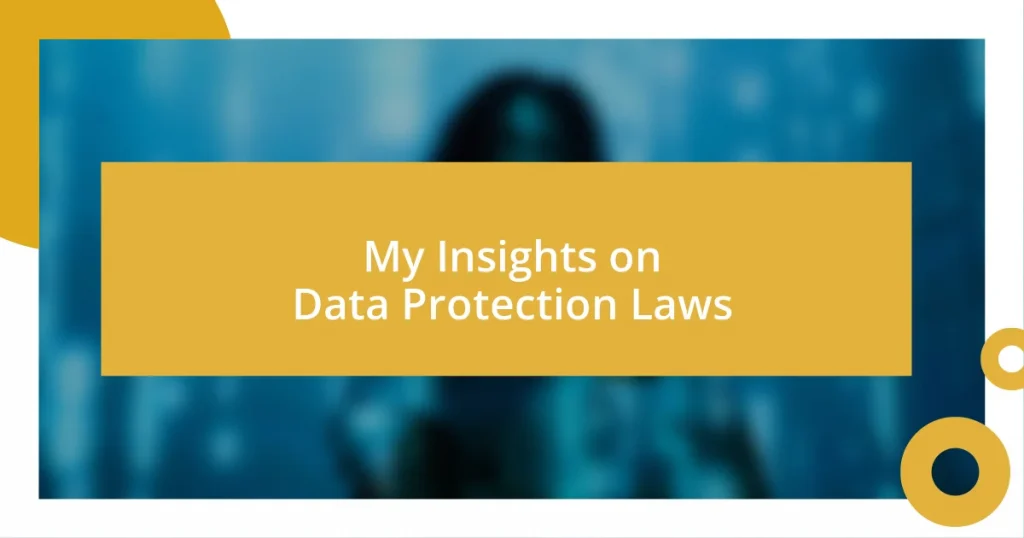Key takeaways:
- Data protection laws, such as GDPR and CCPA, prioritize individual rights and require organizations to be transparent and accountable with personal data.
- Compliance with these laws is not only a legal necessity but also a crucial ethical responsibility that fosters customer trust and safeguards against financial penalties.
- Key principles of data protection include consent, data minimization, and security, which are essential for establishing strong data security practices and ensuring an organization’s long-term viability.
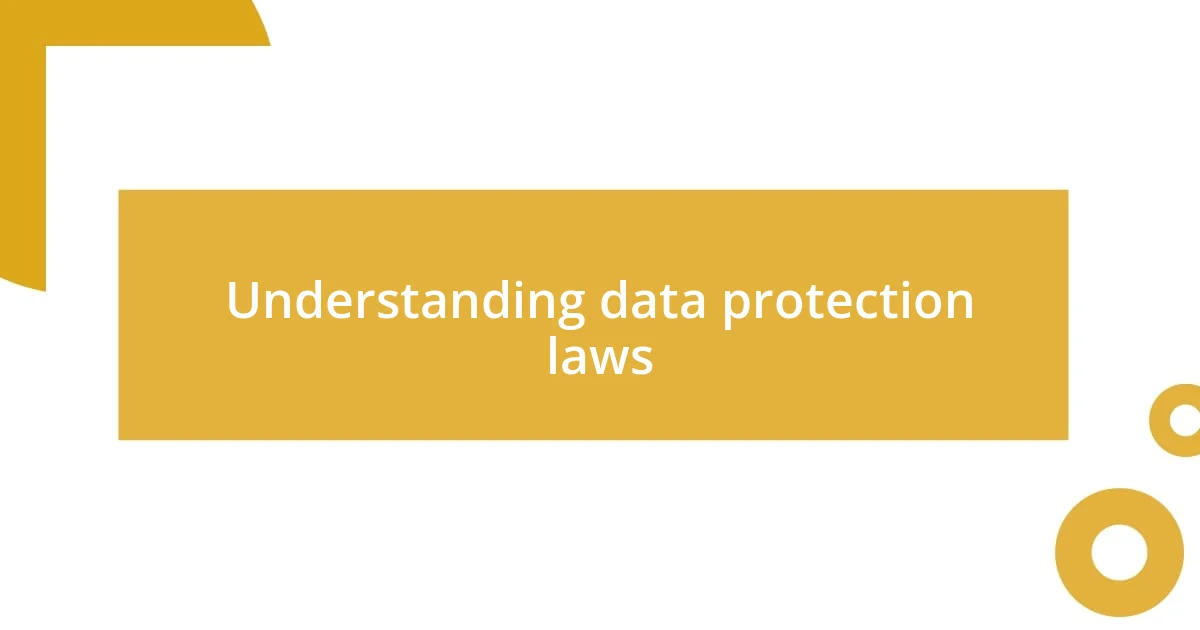
Understanding data protection laws
Data protection laws can sometimes feel overwhelming, can’t they? I remember first diving into the labyrinth of regulations like GDPR and CCPA, feeling a bit lost. It became clear to me that these laws are designed to empower individuals; they protect our personal information from misuse.
As I navigated through various data protection frameworks, I discovered that their essence often revolves around consent and transparency. Have you ever stopped to think about how often we click “I agree” without reading? This reflects a broader issue – our need for better awareness and understanding of our rights when it comes to our data.
Ultimately, these laws represent a fundamental shift towards prioritizing privacy in a digital age. I witnessed firsthand how organizations adapt their practices, striving to balance business needs and consumer trust. It’s a constant evolution, and staying informed has become essential for both individuals and businesses alike.
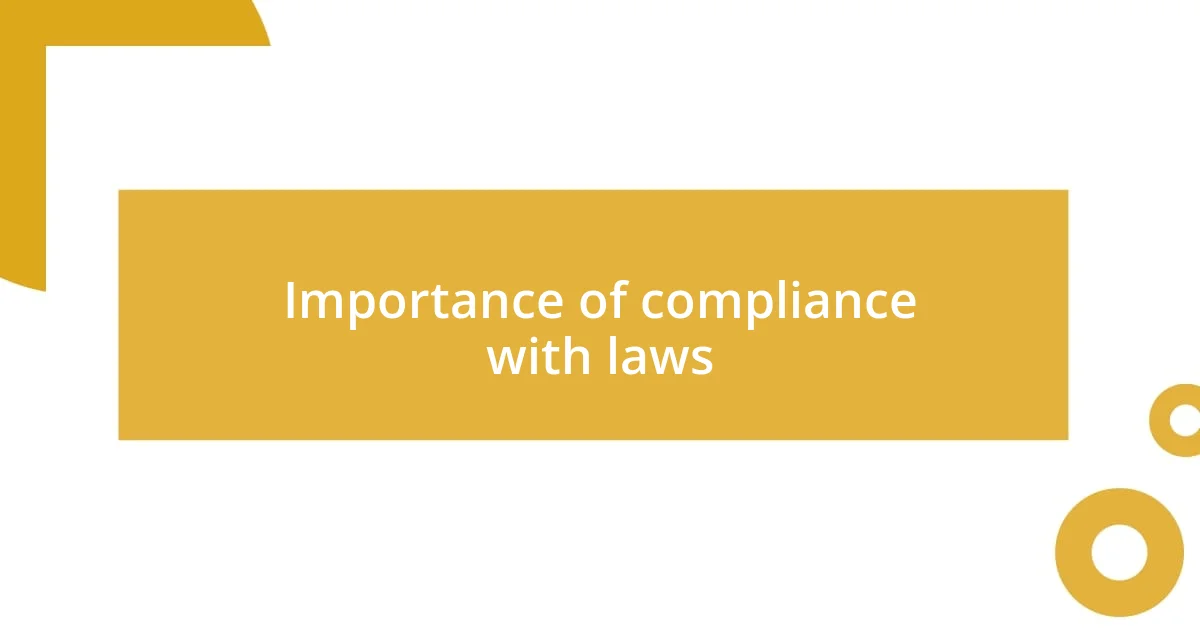
Importance of compliance with laws
Compliance with data protection laws isn’t just a legal obligation; it’s an ethical responsibility. I remember attending a workshop where a speaker shared a heart-wrenching story about a data breach that affected countless individuals. The aftermath was not just about fines; real lives were impacted, highlighting that when companies fail to comply, they could potentially harm their customers, leading to lost trust and loyalty.
Moreover, staying compliant fosters a culture of accountability within organizations. In my experience, companies that prioritize adherence to these regulations often find they build stronger relationships with their clients. It’s interesting how transparency in practices can become a competitive advantage. I’ve seen businesses achieve greater success simply by embracing these laws and communicating their commitment to protecting customer data.
Let’s not overlook the financial implications of non-compliance. I know of one case where a small startup faced crippling fines for neglecting data protection obligations. They struggled to recover financially and emotionally, defining their journey in the harsh reality of regulatory oversight. Adhering to data protection laws can ultimately save organizations from costly repercussions and allow them to focus on innovation and growth.
| Aspect | Importance of Compliance |
|---|---|
| Legal Obligation | Ensures businesses meet required regulations, avoiding legal penalties |
| Trust Building | Fosters deeper relationships with customers through transparency |
| Financial Security | Protection from hefty fines and potential losses due to breaches |
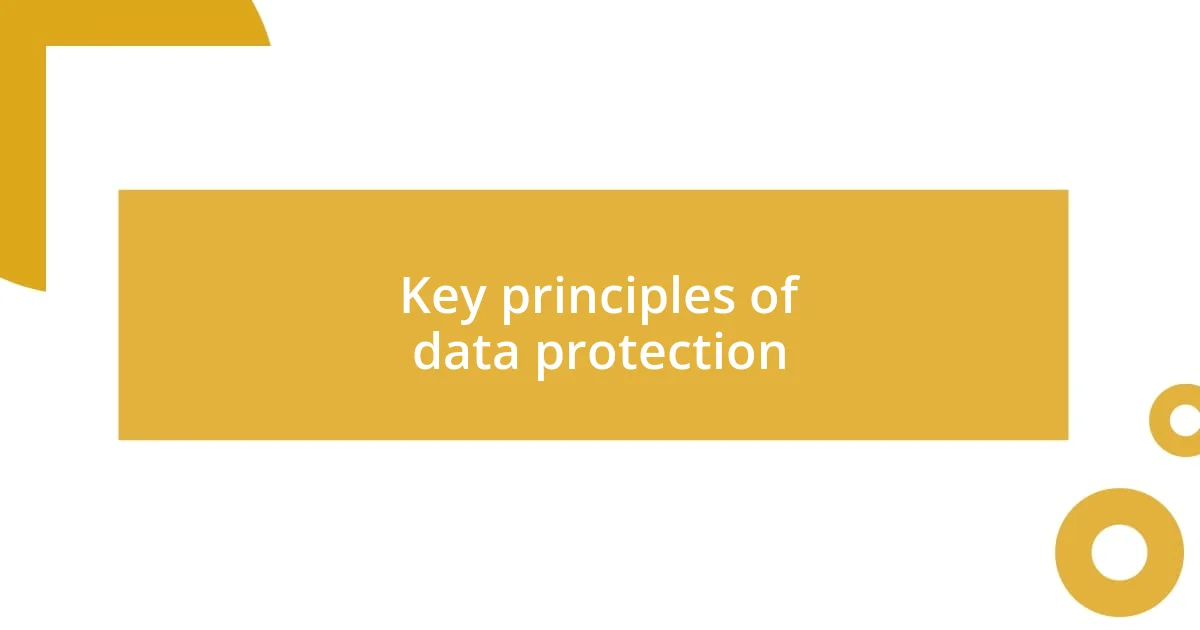
Key principles of data protection
Understanding the key principles of data protection truly transforms how we view privacy in this digital landscape. From my perspective, these principles serve as the foundation upon which effective data protection laws are built. I fondly recall a conversation I had with a friend who runs a small online business. She expressed her confusion about why she suddenly needed to be so transparent with her customers. I explained to her that principles like data minimization—only collecting what is necessary—aren’t just legal requirements; they’re a good practice that respects individuals’ privacy.
Here are some key principles that every data protection framework typically emphasizes:
- Consent: Personal data should be processed only if individuals freely give their explicit permission.
- Purpose Limitation: Data must be collected for specific, legitimate purposes and not used in ways incompatible with those purposes.
- Data Minimization: Organizations should only collect information that is necessary for fulfilling the intended purpose.
- Accuracy: Data should be kept accurate and up to date, ensuring that incorrect information is rectified.
- Storage Limitation: Personal data should not be kept for longer than necessary for its intended purpose.
- Integrity and Confidentiality: Organizations must ensure adequate security measures are in place to protect personal data from breaches.
When I apply these principles to real-life scenarios, it becomes clear how essential they are to our daily interactions online. Recently, I reflected on my own social media usage. I often think, “Why does this platform need my location data?” One night, while scrolling through settings, I realized I could limit the app’s access. This simple action grounded in the principle of data minimization made me feel more in control of my information. Embracing these principles certainly bridges the gap between compliance and genuine safeguarding of personal data.
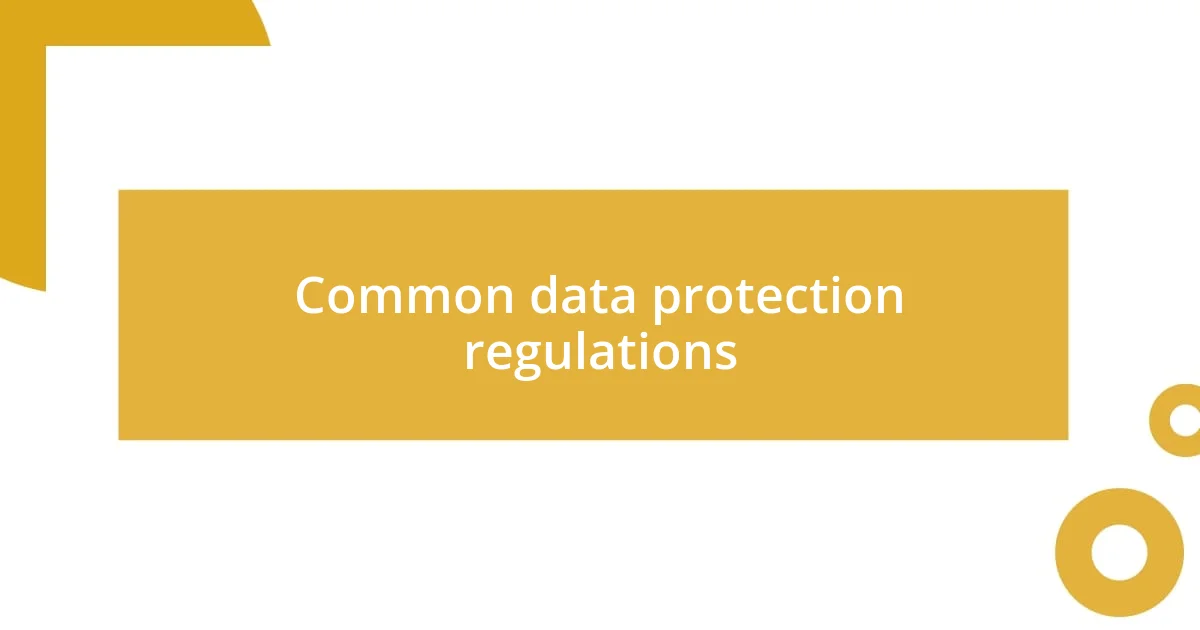
Common data protection regulations
Common data protection regulations can sometimes feel overwhelming, but familiarizing ourselves with them is essential. One of the most recognized regulations is the General Data Protection Regulation (GDPR), which sets stringent guidelines for data collection and processing in the European Union. I remember a time when I was reading about the GDPR; it hit me how much this regulation emphasizes consumer rights, including the right to access their own data. It made me wonder, “What if every regulation had such a strong focus on empowering individuals?”
Then there’s the California Consumer Privacy Act (CCPA), which has made waves in the United States. This law gives California residents more control over their personal information and holds businesses accountable for how they handle that data. I recall chatting with a colleague about how businesses in California had to change their strategies to comply. It was fascinating to see the proactive approaches some companies took; they started to openly communicate with customers about their data practices, fostering an environment of trust rather than fear.
Another notable framework is the Health Insurance Portability and Accountability Act (HIPAA), specifically for health-related data in the U.S. I was once part of a project that dealt with sensitive patient information, and the rigor of HIPAA regulations was both daunting and necessary. It forced us to think critically about the ethics of data handling, ensuring patient confidentiality wasn’t just a box to check but a genuine commitment to care. Isn’t it remarkable how these regulations can challenge organizations to prioritize their ethical duties towards individuals? Each of these regulations reflects not just legal compliance but a shift towards greater respect for personal privacy in our increasingly digital world.
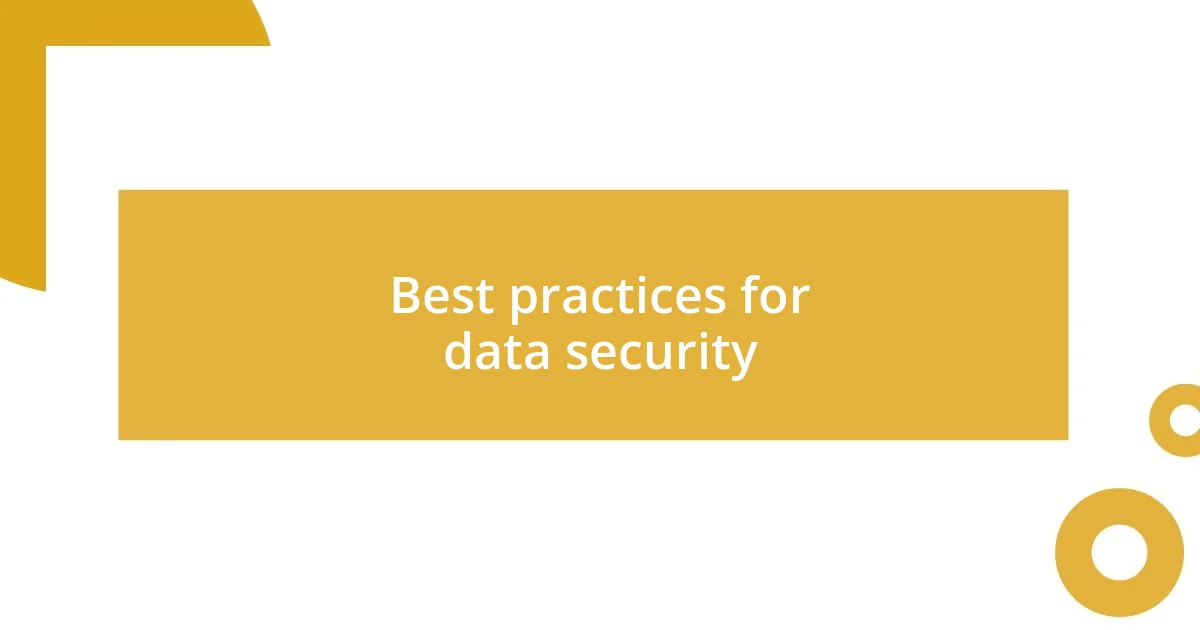
Best practices for data security
Implementing strong data security practices is essential in today’s digital environment. One fundamental practice I always advocate for is regularly updating passwords. I recall a time when I received a notification about a data breach from a service I used. It made me anxious because I realized how many accounts I reused that same password on. Now, I use unique passwords and a password manager. It’s a small step that can have a big impact on my overall security.
Another crucial aspect is employee training. I remember attending a workshop focused on phishing attacks, which are often the entry point for cybercriminals. Learning how easily one can be misled by a seemingly innocent email made me rethink my habits. Organizations should prioritize regular training sessions to ensure that every team member understands the risks and signs of such attacks. After all, a single mistake can compromise an entire network, so why not empower employees with knowledge?
Finally, I can’t stress enough the importance of regular data backups. There was a time when I lost valuable files due to a hardware failure, leaving me frustrated and helpless. Now, I back up my data consistently using both cloud storage and physical drives. This not only provides peace of mind but also ensures that I can quickly recover from unexpected incidents. How often do you think about securing your data? It’s an easy practice that can save a lot of heartache down the road!
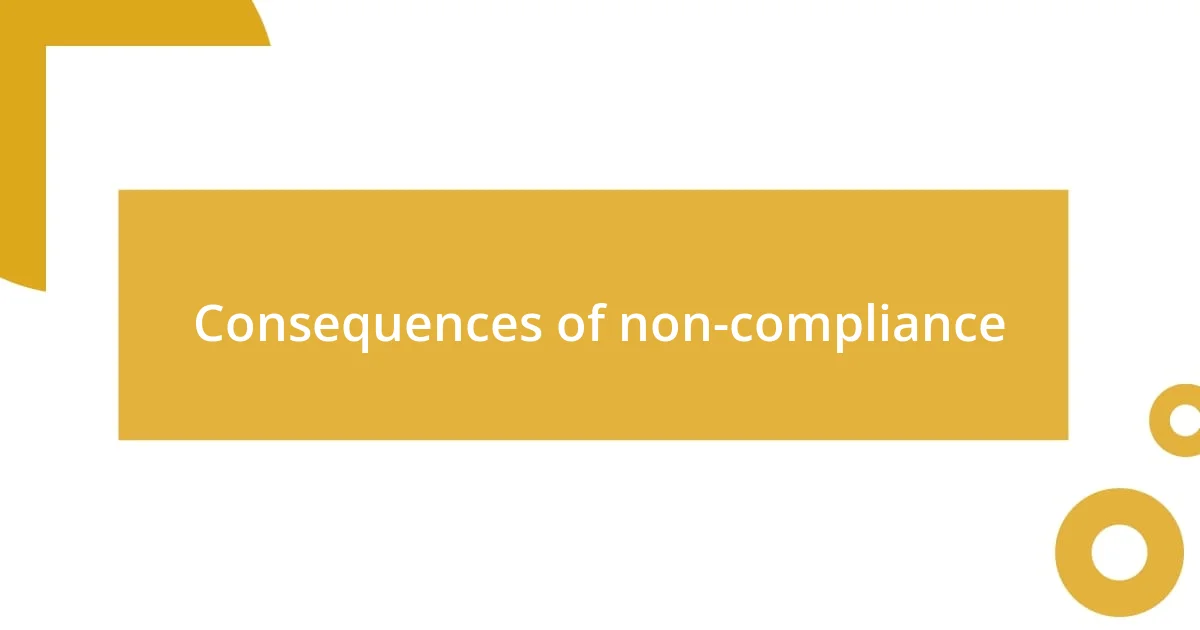
Consequences of non-compliance
I’ve encountered firsthand just how costly consequences of non-compliance with data protection laws can be. One organization I worked with faced hefty fines because they failed to comply with GDPR requirements. It was eye-opening to see how a significant portion of their budget was wiped out almost overnight due to penalties. Can you imagine the ripple effect that had on their operations?
Beyond financial implications, the fallout can also include reputational damage. A friend of mine who runs a small business had to deal with a serious data breach. The trust of his customers evaporated, and it took years for him to rebuild that rapport. It struck me that losing customer confidence can be just as damaging, if not more so, than the penalties themselves. What is a business without the trust of its customers?
Lastly, non-compliance can lead to legal repercussions, including lawsuits. I remember attending a conference where a legal expert shared a case study of a company that was sued by clients after a data breach. The legal fees and settlements drained resources that could have been invested in growth. It reminded me that staying compliant isn’t just about avoiding fines; it’s about safeguarding the future of the organization. So, doesn’t it make sense to prioritize compliance before facing such grave consequences?










